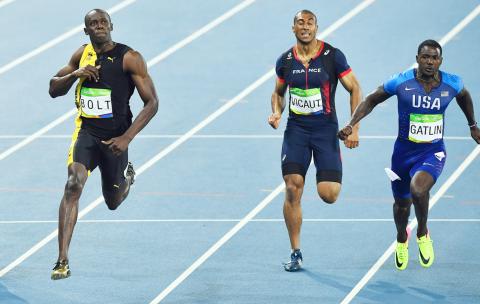Usain Bolt sauntered onto the track, stretched out his arms and waved his hands, signaling for more applause.
He knew how this night was going to go.
Bolt’s swan song in the Olympic 100m on Sunday night was a no-doubter — a pedestrian-by-his-standards 9.81-second sprint down the straightaway, but not so slow that he could not take time to point at his own chest with his thumb a step before he crossed the finish line.

Photo: AFP
“It was brilliant,” Bolt said. “I didn’t go so fast, but I’m so happy I won. I told you guys I was going to do it.”
He won his record-setting third straight title in track’s featured event and his seventh Olympic gold. He has already swept aside pretty much every sprinter who had any claim on being the greatest.
So, on a muggy night in Rio, Bolt took aim at Michael Phelps, shoving the swimmer and all his 23 medals to the background and made it official: The Bolt Games have begun.
Bolt beat the US’ Justin Gatlin, who was greeted by the fans with raucous boos, by .08 seconds. Andre de Grasse of Canada won the bronze.
Bolt has a chance for two more golds — in his favorite race, the 200m final on Thursday, and then in the 4x100m relay on Saturday night.
The 195.6cm sprinter/celebrity overcame his typically slow unfurling from the blocks — he was second-to-last after the break — then churned his legs to gradually build up speed. He caught Gatlin with about 40m left and the rest was a matter of how hard he wanted to run.
Gatlin pursued him gamely, the way he has for years. He finished with silver again and, while Bolt was celebrating with anyone he could find, Gatlin was parading the US flag around the track virtually alone.
The boos from the Brazilian crowd were the latest ugly chapter in Gatlin’s saga. He has been caught for doping twice.
“That’s the first time I’ve gone into a stadium and they’ve started to boo,” Bolt said. “It surprised me.”
A split-second after he crossed, Bolt raised an index finger, and then the real party began.
Bolt unlaced his now-famous gold spikes and took selfies with fans. He turned his yellow hat backward, kneeled down and gave the crowd what it really wanted — that famous, arching, “To the World” pose that he debuted eight years ago in Beijing.
Chants of “Bolt, Bolt, Bolt” rang out from the near-capacity stadium.

MORE VISITORS: The Tourism Administration said that it is seeing positive prospects in its efforts to expand the tourism market in North America and Europe Taiwan has been ranked as the cheapest place in the world to travel to this year, based on a list recommended by NerdWallet. The San Francisco-based personal finance company said that Taiwan topped the list of 16 nations it chose for budget travelers because US tourists do not need visas and travelers can easily have a good meal for less than US$10. A bus ride in Taipei costs just under US$0.50, while subway rides start at US$0.60, the firm said, adding that public transportation in Taiwan is easy to navigate. The firm also called Taiwan a “food lover’s paradise,” citing inexpensive breakfast stalls

TRADE: A mandatory declaration of origin for manufactured goods bound for the US is to take effect on May 7 to block China from exploiting Taiwan’s trade channels All products manufactured in Taiwan and exported to the US must include a signed declaration of origin starting on May 7, the Bureau of Foreign Trade announced yesterday. US President Donald Trump on April 2 imposed a 32 percent tariff on imports from Taiwan, but one week later announced a 90-day pause on its implementation. However, a universal 10 percent tariff was immediately applied to most imports from around the world. On April 12, the Trump administration further exempted computers, smartphones and semiconductors from the new tariffs. In response, President William Lai’s (賴清德) administration has introduced a series of countermeasures to support affected

CROSS-STRAIT: The vast majority of Taiwanese support maintaining the ‘status quo,’ while concern is rising about Beijing’s influence operations More than eight out of 10 Taiwanese reject Beijing’s “one country, two systems” framework for cross-strait relations, according to a survey released by the Mainland Affairs Council (MAC) on Thursday. The MAC’s latest quarterly survey found that 84.4 percent of respondents opposed Beijing’s “one country, two systems” formula for handling cross-strait relations — a figure consistent with past polling. Over the past three years, opposition to the framework has remained high, ranging from a low of 83.6 percent in April 2023 to a peak of 89.6 percent in April last year. In the most recent poll, 82.5 percent also rejected China’s

PLUGGING HOLES: The amendments would bring the legislation in line with systems found in other countries such as Japan and the US, Legislator Chen Kuan-ting said Democratic Progressive Party (DPP) Legislator Chen Kuan-ting (陳冠廷) has proposed amending national security legislation amid a spate of espionage cases. Potential gaps in security vetting procedures for personnel with access to sensitive information prompted him to propose the amendments, which would introduce changes to Article 14 of the Classified National Security Information Protection Act (國家機密保護法), Chen said yesterday. The proposal, which aims to enhance interagency vetting procedures and reduce the risk of classified information leaks, would establish a comprehensive security clearance system in Taiwan, he said. The amendment would require character and loyalty checks for civil servants and intelligence personnel prior to